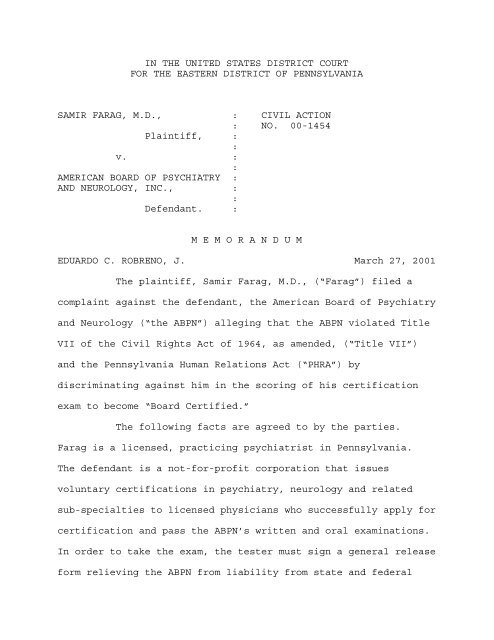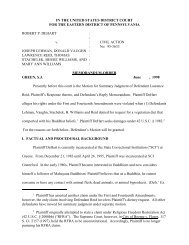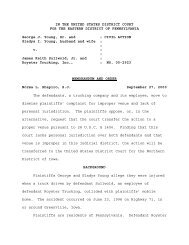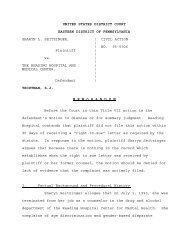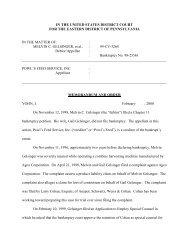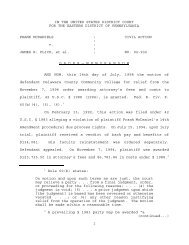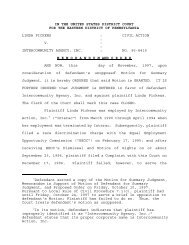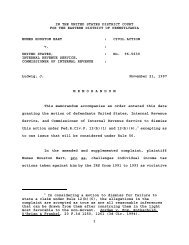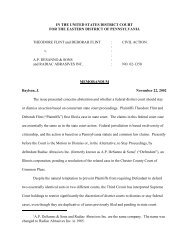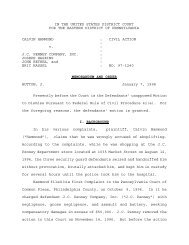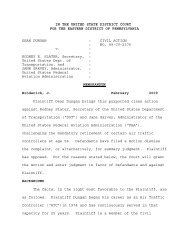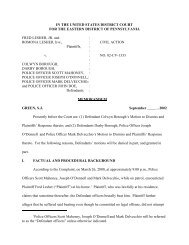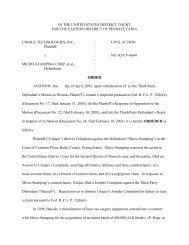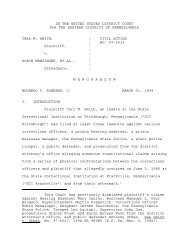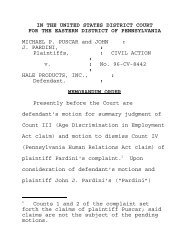samir farag, m.d. - Eastern District of Pennsylvania
samir farag, m.d. - Eastern District of Pennsylvania
samir farag, m.d. - Eastern District of Pennsylvania
You also want an ePaper? Increase the reach of your titles
YUMPU automatically turns print PDFs into web optimized ePapers that Google loves.
IN THE UNITED STATES DISTRICT COURT<br />
FOR THE EASTERN DISTRICT OF PENNSYLVANIA<br />
SAMIR FARAG, M.D., : CIVIL ACTION<br />
: NO. 00-1454<br />
Plaintiff, :<br />
:<br />
v. :<br />
:<br />
AMERICAN BOARD OF PSYCHIATRY :<br />
AND NEUROLOGY, INC., :<br />
:<br />
Defendant. :<br />
M E M O R A N D U M<br />
EDUARDO C. ROBRENO, J. March 27, 2001<br />
The plaintiff, Samir Farag, M.D., (“Farag”) filed a<br />
complaint against the defendant, the American Board <strong>of</strong> Psychiatry<br />
and Neurology (“the ABPN”) alleging that the ABPN violated Title<br />
VII <strong>of</strong> the Civil Rights Act <strong>of</strong> 1964, as amended, (“Title VII”)<br />
and the <strong>Pennsylvania</strong> Human Relations Act (“PHRA”) by<br />
discriminating against him in the scoring <strong>of</strong> his certification<br />
exam to become “Board Certified.”<br />
The following facts are agreed to by the parties.<br />
Farag is a licensed, practicing psychiatrist in <strong>Pennsylvania</strong>.<br />
The defendant is a not-for-pr<strong>of</strong>it corporation that issues<br />
voluntary certifications in psychiatry, neurology and related<br />
sub-specialties to licensed physicians who successfully apply for<br />
certification and pass the ABPN’s written and oral examinations.<br />
In order to take the exam, the tester must sign a general release<br />
form relieving the ABPN from liability from state and federal
discrimination laws. Although Farag passed the written exam in<br />
1991, he failed the oral exam on three separate occasions, the<br />
last time occurring in June <strong>of</strong> 1994. On the last occasion, the<br />
ABPN notified him by letter dated July 1, 1994. Farag took no<br />
legal action regarding any <strong>of</strong> these failures until he allegedly<br />
read an article on July 5, 1996 detailing allegations against the<br />
ABPN that its testing procedures, specifically the oral aspect <strong>of</strong><br />
the exam, were racially discriminatory. On November 11, 1996,<br />
Farag filed a complaint with the <strong>Pennsylvania</strong> Human Rights<br />
Commission (“PHRC”). On January 27, 1997, a charge <strong>of</strong><br />
discrimination was filed with the Equal Employment Opportunity<br />
Commission (“EEOC”).<br />
On March 20, 2000, Farag filed his<br />
complaint in this court.<br />
On May 25, 2000, the defendant, American Board <strong>of</strong><br />
Psychiatry and Neurology (“the ABPN”) filed a motion to dismiss,<br />
or in the alternative, a motion for summary judgment, seeking to<br />
dismiss the plaintiff’s claims <strong>of</strong> discrimination asserted under<br />
Title VII and the PHRA. On June 28, 2000, the court held oral<br />
arguments on the issues raised in the defendant’s motion. The<br />
court denied without prejudice defendant’s motion for summary<br />
judgment and extended the discovery period until August 28, 2000<br />
in order to permit the parties to acquire additional information<br />
on the issues raised in ABPN’s motion. On the very day that the<br />
extended discovery period ended, during which it appears neither<br />
party conducted any further discovery, the ABPN filed a renewed<br />
-2-
motion for summary judgment (doc. no. 16). On September 8, 2000,<br />
Dr. Farag filed a timely response to the ABPN’s renewed motion<br />
(doc. no. 17).<br />
In its renewed motion for summary judgment, the ABPN<br />
raises two legal claims. First, ABPN argues that Farag’s claims<br />
are time-barred under the discovery rules for discrimination<br />
claims because Farag failed to file those claims within the twoyear<br />
statutory period allowed in <strong>Pennsylvania</strong>. Second, ABPN<br />
argues that it cannot be found liable under either <strong>of</strong> Farag’s<br />
claims because he signed a waiver “releas[ing] . . . the Board .<br />
. . from any actions, suits, obligations, damages, claims or<br />
demands” in connection with the exam or the failure <strong>of</strong> the ABPN<br />
to issue him a certificate. Farag responds that his Title VII<br />
and PHRA claims are not time-barred because the statute <strong>of</strong><br />
limitations did not begin to accrue until he read the article in<br />
July <strong>of</strong> 1996 alleging that the ABPN racially discriminated<br />
against its test-takers. Furthermore, Farag argues that, under<br />
the totality <strong>of</strong> the circumstances, he did not “knowingly” and<br />
“willfully” waive his discrimination claims as required under<br />
federal law.<br />
The statute <strong>of</strong> limitations for a Title VII as well as a<br />
PHRA claim is 180 days after the alleged act <strong>of</strong> discrimination.<br />
However, if the plaintiff files the claim with a state or local<br />
agency with authority to adjudicate the claim, the plaintiff is<br />
granted 300 days from the date <strong>of</strong> the alleged discrimination to<br />
-3-
file a complaint with the EEOC. See 42 U.S.C. § 2000e-5(e). The<br />
time period for filing discrimination claims may be extended<br />
under two different doctrines: equitable tolling and the<br />
discovery rule. See Oshiver v. Levin, Fishbein, Sedran & Berman,<br />
38 F.3d 1380, 1385 (3d Cir. 1994). Because the plaintiff has<br />
neither argued that equitable tolling is appropriate in this case<br />
nor pointed to any specific facts that would justify equitable<br />
tolling, the court will focus on the discovery rule as it relates<br />
to the plaintiff’s claim.<br />
“‘As a general rule, the statute <strong>of</strong> limitations begins<br />
to run when the plaintiff’s cause <strong>of</strong> action accrues.’” New Castle<br />
County v. Halliburton Nus Corp., 111 F.3d 1116, 1124 (3d Cir.<br />
1997)(citing Oshiver, 38 F.3d at 1385)). The statute <strong>of</strong><br />
limitations begins to run when “the plaintiff has discovered or,<br />
by exercising reasonable diligence, should have discovered (1)<br />
that he or she has been injured, and (2) that this injury has<br />
been caused by another party’s conduct.” Id. at 1124 (citing<br />
Oshiver, 38 F.3d at 1386)).<br />
In considering Supreme Court precedent on the discovery<br />
rule, the Third Circuit has concluded that “[i]t is . . . evident<br />
that the Supreme Court has fashioned its determinations<br />
concerning the limitations periods to require prompt filing <strong>of</strong><br />
discrimination charges.” Colgan v. Fisher Scientific Co., 935<br />
F.2d 1407, 1418 (3d Cir. 1991). Not surprisingly, then, this<br />
circuit has concluded that “a claim accrues upon awareness <strong>of</strong><br />
-4-
actual injury, not upon awareness that the injury constitutes a<br />
legal wrong.” Halliburton, 111 F.3d at 1125. In elaborating on<br />
this point, the Halliburton court noted that “[t]he discovery<br />
rule does not delay the running <strong>of</strong> the statute <strong>of</strong> limitation<br />
until a plaintiff is aware <strong>of</strong> all <strong>of</strong> the facts necessary to bring<br />
a cause <strong>of</strong> action.” Id.<br />
In this case, Farag discovered that he was injured in<br />
July 1994 when he received ABPN’s letter informing him that he<br />
had failed the oral section <strong>of</strong> the certification exam.<br />
Obviously, at the same time, he was aware that ABPN was the party<br />
responsible for failing him. Therefore, under the discovery<br />
rule, Farag had until January 1995 to file a claim with the PHRC<br />
and until July 1995 to file with the EEOC. As he did not, he is<br />
now time-barred from pursuing this claim. Farag’s contention<br />
that he did not discover he was discriminated against until he<br />
read an article in July <strong>of</strong> 1996 concerning the ABPN’s alleged<br />
testing practices is not grounds for extending the date <strong>of</strong><br />
accrual. As noted by Judge Bechtel, in interpreting the<br />
discovery rule as pronounced in Oshiver, knowledge <strong>of</strong> the<br />
discrimination is not necessary for the statute <strong>of</strong> limitations to<br />
begin to run in Title VII claims. Harper v. Court <strong>of</strong> Common<br />
Pleas <strong>of</strong> Philadelphia, No. CIV. A. 99-4906, 2000 WL 688169 *2<br />
(E.D.Pa. May 26, 2000) (“Under the discovery rule, [p]laintiff<br />
did not have to discover that her injury was based on<br />
discrimination, but need only be ‘aware <strong>of</strong> the existence <strong>of</strong> and<br />
-5-
source <strong>of</strong> the injury.’”). Even if such a requirement was<br />
necessary under the discovery rule, Farag has failed to provide<br />
any evidence in his response to ABPN’s motion for summary<br />
judgment, demonstrating that he did in fact read an article in<br />
July 1996 concerning ABPN’s testing practices or the date and<br />
time <strong>of</strong> publication <strong>of</strong> that article.<br />
For the reasons stated above, the court grants ABPN’s<br />
motion for summary judgment on the grounds that Farag’s claims<br />
are time-barred. Because the court’s ruling on this one issue is<br />
dispositive <strong>of</strong> Farag’s entire complaint, it is unnecessary for<br />
the court to rule on the issue <strong>of</strong> the alleged waiver releasing<br />
ABPN <strong>of</strong> all discrimination claims.<br />
An appropriate order follows.<br />
-6-
IN THE UNITED STATES DISTRICT COURT<br />
FOR THE EASTERN DISTRICT OF PENNSYLVANIA<br />
SAMIR FARAG, M.D., : CIVIL ACTION<br />
: NO. 00-1454<br />
Plaintiff, :<br />
:<br />
v. :<br />
:<br />
AMERICAN BOARD OF PSYCHIATRY :<br />
AND NEUROLOGY, INC., :<br />
:<br />
Defendant. :<br />
ORDER<br />
AND NOW, this 27th day <strong>of</strong> March, 2001, upon<br />
consideration <strong>of</strong> defendant’s motion for summary judgment and<br />
plaintiff’s response to defendant’s motion, it is hereby ORDERED<br />
that defendant’s motion for summary judgment (doc. no. 16) is<br />
GRANTED. It is further ORDERED that judgment is entered in favor<br />
<strong>of</strong> defendant and against plaintiff. The case shall be marked<br />
CLOSED.<br />
AND IT IS SO ORDERED.<br />
_________________________<br />
EDUARDO C. ROBRENO, J.


